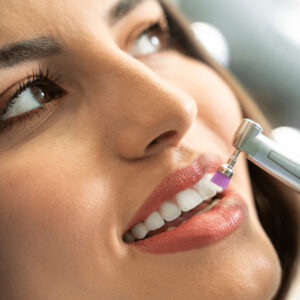Teeth Cleaning
Promoting Oral Health through Professional Care
Dental cleaning, also known as prophylaxis or a dental hygiene appointment, is a crucial component of preventive oral care.
This routine procedure is performed by dental hygienists and plays a vital role in maintaining optimal oral health. Here’s an overview of dental cleaning:
1. Importance of Dental Cleaning:
- Plaque and Tartar Removal: Dental cleaning removes plaque, a sticky film of bacteria, and calculus (tartar), a hardened form of plaque, from the teeth and gums.
- Prevention of Gum Disease: Regular cleanings help prevent and manage gingivitis and periodontal disease by addressing early signs of inflammation.
- Cavity Prevention: Removal of plaque and tartar helps prevent tooth decay and cavities.
- Fresh Breath: Dental cleaning contributes to improved breath by eliminating bacteria that can cause bad breath.
2. Components of Dental Cleaning:
- Scaling: The removal of plaque and tartar from tooth surfaces, including areas below the gumline.
- Polishing: Smoothing the tooth surfaces to remove stains and make it more difficult for plaque to accumulate.
- Fluoride Treatment: Application of fluoride to strengthen tooth enamel and prevent decay.
3. Dental Cleaning Process:
- Physical Examination: The dental hygienist may examine the teeth and gums to identify any issues or areas of concern.
- Scaling: Using specialized tools, the hygienist carefully removes plaque and tartar from the teeth.
- Polishing: Tooth surfaces are polished to remove surface stains and create a smooth texture.
- Fluoride Application: In some cases, fluoride may be applied to strengthen the teeth and provide additional protection.
4. Frequency of Dental Cleanings:
- Individualized Schedule: The frequency of dental cleanings varies based on individual oral health needs, with most individuals recommended to have cleanings every six months.
- Periodontal Health: Individuals with gum disease or a history of periodontal issues may require more frequent cleanings.
5. Benefits of Regular Dental Cleanings:
- Preventive Care: Dental cleanings are a proactive measure to prevent dental issues before they become more serious.
- Early Detection: Regular cleanings allow for the early detection of potential problems, enabling timely intervention.
- Overall Health Connection: Good oral health is linked to overall health, with regular cleanings contributing to a healthier mouth and potentially reducing the risk of systemic conditions.
6. Home Oral Care Practices:
- Brushing: Regular and effective brushing, preferably twice a day, helps control plaque formation.
- Flossing: Daily flossing is essential for cleaning between teeth and below the gumline.
7. Patient Education:
- Oral Hygiene Instruction: Dental hygienists often provide personalized guidance on proper oral care practices, including brushing and flossing techniques.
Regular dental cleanings are a fundamental aspect of preventive dentistry, promoting not only a clean and healthy smile but also contributing to overall well-being. If you have questions about the frequency of cleanings or specific oral care practices, consult with your dental professional for personalized guidance based on your unique oral health needs.

